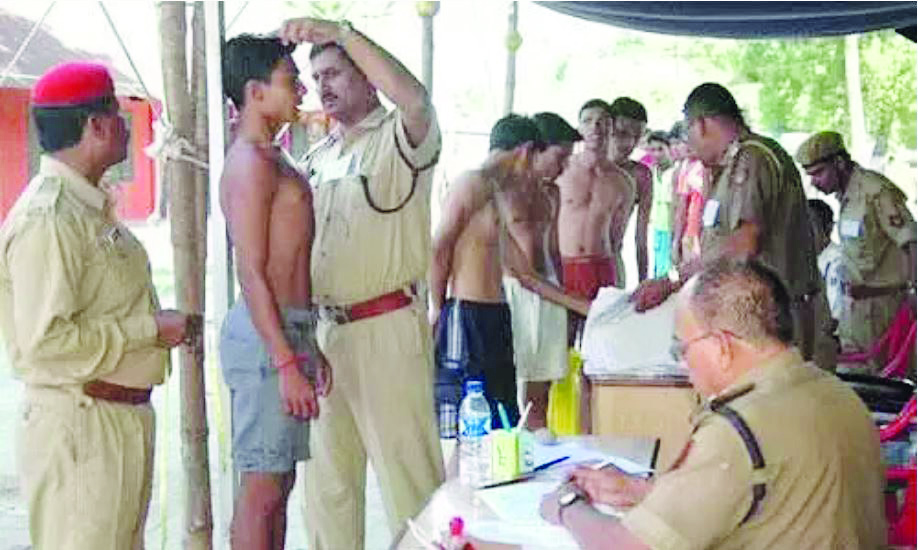Goa is abuzz with excitement as vintage bike and car owners, users, collectors and fans are decking […]

SPACE FOR DISSENT SHRINKING! By Jyotirmoy Talukdar
May 07 - May 13 2022 May 7, 2022Caption: ADMONISHED: Police constables protesting the delay in the announcement of the results of the recruitment were accused of being ‘andolanjeevis’ (compulsive agitators) by the Assam Director General of Police.
Intro: Taking his cue from Prime Minister Narendra Modi, Director General of the Assam Police Bhaskar Jyoti Mahanta, cracked down even on legitimate dissent by candidates who applied for jobs as constables, and protested about the delay in the declaration of results.
By Jyotirmoy Talukdar
In what is reminiscent of Prime Minister Narendra Modi’s ‘andolanjeevi’ sledge, the Assam Director-General of Police Bhaskar Jyoti Mahanta was recently seen angry with those who dissent.
Referring to candidates demanding results on time, the top cop commented, “Assam Police does not need (as its future members) people who are involved in unnecessary and illegal activities. Assam Police needs responsible, disciplined folks… Many in the police force are in hardship, their accommodation is poor and they have to tread the jungles for operations, have to stay there for days. Many sipahis don’t get their salaries for long periods due to various reasons.”
“Does this mean they will protest?” the DGP asked, rhetorically.
The statement is quite interesting: it acknowledges the inadequate ways in which his department treats its subordinates, yet presupposes that the most natural response from these burnt offerings must be to accept. Or else, they will have to be ready to follow Tej Bahadur Yadav’s trajectory. The possibility of dissent does not exist. Hidden in this verbal almsgiving by the boss, instead, lies a different possibility – that of a recognition of his benevolence.
“Assam Police doesn’t need these men who protest for these reasons. Because, when they come, they will spoil Assam Police,” the top cop added. These utterances hint at the dangerous situation that the country is in – your background check must prove that you don’t dare to claim your basic rights not just after you have joined work, but in your entire life that preceded.
The protestors that the DGP was referring to were job applicants, not job-holding police personnel.
The question needs to be asked, if the DGP, as a Ramjas College student in the 1980s, had joined a Delhi University students’ protest and found himself blacklisted by the Union Public Service Commission, would he complain? Where would he be today?
Fall in line or face consequences
The unfortunate statement must be seen as part of a series of such threats and opinions pronounced in the last few years. Beginning with Jawaharlal Nehru University and quickly spreading into many other educational institutions, the act of thinking is being actively discouraged. Any demonstration – public or private – of dissent is not just brutally quelled, but sufficiently humiliated so that fewer people dare to think critically the next time.
Professors are being routinely arrested without bail in sight. The MPhil degree has been scrapped. PhD seats are being drastically cut down. Because an environment of research, questions, theses, arguments, counterarguments must not be encouraged. It is a threat. It is in this light that the DG’s remarks must be read.
But he must also be told about a brilliant essay that his contemporary at Delhi University, Amitav Ghosh, wrote about the 1984 Sikh massacre. Ghosh recounted a passage from V.S. Naipaul where the latter describes a demonstration and how, despite longing to join the crowd and sympathising with their cause, he just observes it marching past. He realises that he is not someone who joins, but only watches with solidarity.
Writing about a protest organised against the 1984 pogroms, Ghosh writes, “I remembered the passage because I believed that I, too, was not a joiner, and in Naipaul’s pitiless mirror I thought I had seen an aspect of myself rendered visible. Yet as this forlorn little group marched out of the shelter of the compound I did not hesitate for a moment: without a second thought, I joined.”
One hopes that if not today, then after his retirement in a few months, Bhaskar Jyoti Mahanta, who after all made a national award-winning biopic of a dissenter, will also walk down the stairs and merge with the crowd asking real and urgent questions of the government.
Courtesy: The Wire















